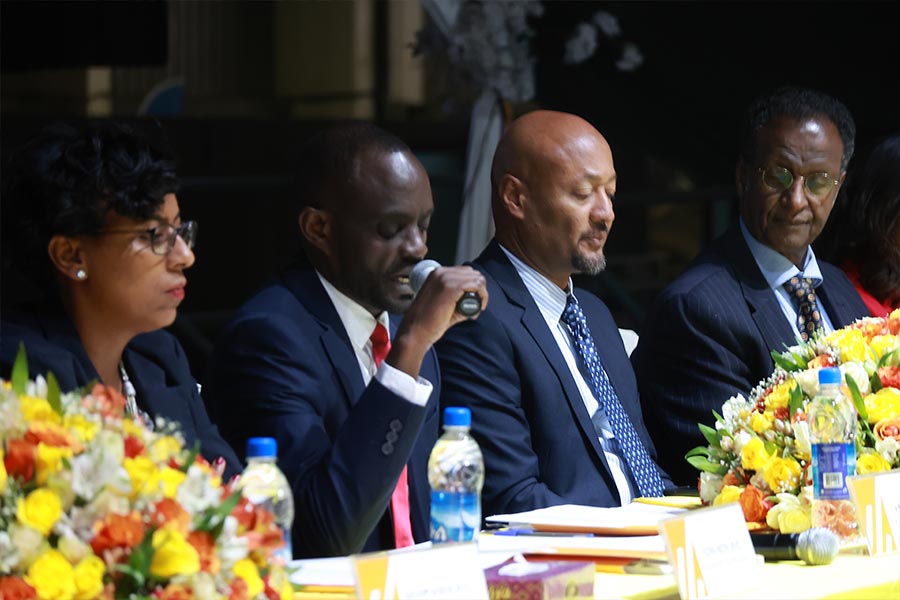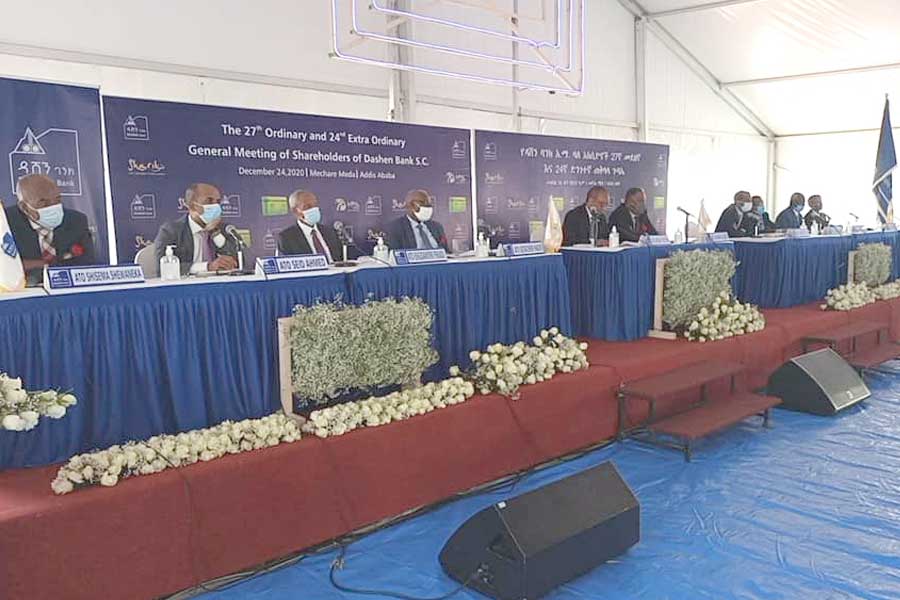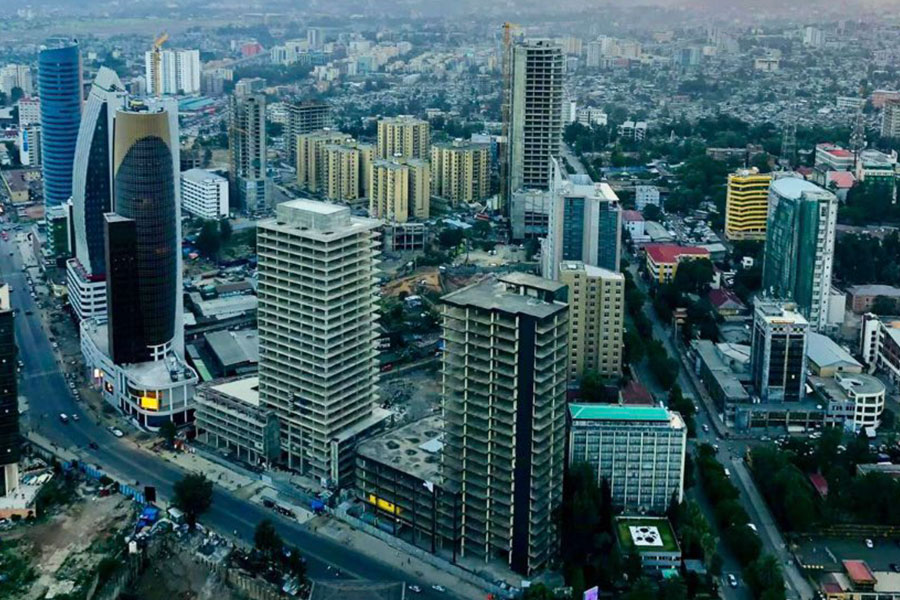
Radar | Dec 02,2023
Aklilu Wubet of Wegagen Bank and his executives had a lot to celebrate when they met rather anxious shareholders last December as they made a turnaround in the Bank's adversities and came out of the pit from the past two years. They have registered considerable gains, netting over half a billion Birr in profit for the financial year of 2021/22, a staggering rise of 335pc from the previous year.
It is an outcome translated to exponential earnings per share (EPS) of 16.6pc, three times larger than the previous year, and a 10pc return on equity.
Although the performance is much lower than what was achieved a couple of years ago, Wegagen's recovery is impressive given the ordeals it encountered recently, according to Abdulmenan Mohammed, a keen observer of Ethiopia's financial sector, with close to two decades of experience. However, he cautions Aklilu and his team to watch the improved performance as the main driver was a significant decline in provision for loans not performing, and other assets have plunged to 107.4 million Br, a whopping drop of 86.4pc.
Aklilu argued that the provision is neither less nor beyond the regulator's cap. He was appointed to take the helm as the Bank's seventh president in February last year when the Bank underwent public backlash following inaccurate media reporting that led to a bank run. In a short period, Wegagen faced a withdrawal of over a billion Birr, shaking its liquidity position.
Under Aklilu's watch, incomes from interest on loans, advances and investments grew by 3.8pc to 4.05 billion Br, four times higher than the industry average for all the private banks. Interest paid on deposits increased by 23.1pc to 1.81 billion Br, reducing net interest income by 8.5pc. Operating expenses saw salaries and benefits rise by 6.7pc to 1.6 billion Br, and other operating expenses went up by 5.5pc to 1.02 billion Br.
"Wegagen did very well controlling its operating expenses," applauds Abdulemanen.
Chairman of the Board, Abdishu Hussien, concurs. Open-eyed cost reduction measures had been taken in addition to enhancing the operational performance of branches in the conflict areas, according to Abdishu.
The expert, however, characterised Wegagen's performances in financial intermediation, fees, and service charge income as inadequate, seeing it dropping by 14.8pc to 897.4 million Br. This meets 45pc of the average revenues for the eight banks in Wegagen's league.
The Bank's executives concur. They attributed the weak performance to the closure of hundreds of branches in the north, particularly in the Tigray Regional State, where a bloody and devastating civil war broke out in November 2020.
Wegagen was one of the few banks disproportionately impacted by the civil war in the north. It suffered significant financial losses due to the disruption of services and closure of depositors' accounts, where it has one of its most extensive networks of 112 branches.
Abdishu acknowledged the year's difficulties, as the number of branches in the Tigray Regional State underwent closure and became out of the range of management supervision during the two-year war. Wegagen inserted one foot, reopening half of its branches in Meqelle and other towns following a pact between the federal government and armed forces in Tigray, signed in November last year in Pretoria, South Africa.
It managed to increase paid-up capital by three percent to 3.4 billion Br, a far cry from the five billion Birr capital threshold the Central Bank authorities have imposed on all the banks to comply with, come 2026.
Amanuel Demeke is one of Wegagen's over 7,000 shareholders who acquired 3.2 million Br shares 10 years ago. He reminisces on the more successful years of Wegagen and believes climbing back to its former stature will not be easy. He has seen dividends he collected fall to 200,000 Br. However, after observing the latest performances, he decided to buy more shares from the Bank.
Wegagen's shareholders, gathered at the Hilton in December last year, resolved to raise paid capital to 20 billion in the next five years. The Bank's President sees this as a vitally strategic move to boost Wegagen's competitiveness in the industry that foresees the entry of foreign-owned banks.
The Bank remains one of the biggest private banks with a 13pc equity to assets ratio, two percentage points above the average for the eight most prominent private banks. Its equity-to-loan ratio of 19pc is second to Oromia Bank's 22pc and one percentage point higher than the average for the eight banks: Awash, Abyssinia, Dashen, Oromia Coop, Hibret and Oromia.
Asheber Kufgaha has served as Wegagen's branch manager in the Lancha area for over four years. He saw business transactions through the Bank have slowed down due to the complete closure of branches in the north. At 40 million Br, the income from fees and commissions last year was the lowest of the eight banks, representing 0.6pc of their average. However, the Bank performed better in deposit mobilisation and fees from import-export than the preceding year, according to Ashber.
Wegagen's asset base expanded last year to 43.1 billion Br, growing by 8.8pc; yet, comprising 42pc of the average in its class, the asset size is the lowest among the eight banks, only preceded by Oromia's 52 billion Br. Wegagen disbursed loans and advances of 28.9 billion Br, an increase of 11pc, but claimed 40pc of the average for the banks in its category. It mobilised a deposit of 33.9 billion, lower by 13.3 million Br compared to last year's industry average.
Wegagen's loan to deposits ratio went up to 85.3pc from 82.7pc. Still, it remained one percentage point above the average for its class, where the Bank of Abyssinia and Dashen Bank have recorded the highest of 91pc and 87pc. The liquidity position of the Bank increased in value and relative terms. Its cash and bank balances went up by 112.8pc to 10.3 billion Br. The ratio of liquid assets to total assets increased from 12.2 pc to 23.9pc, mainly achieved by dispensing its investments with the Central Bank's bond.
The capital and non-distributable reserves with the Central Bank increased by 7.6pc to 5.4 billion Br. The Bank's capital adequacy ratio remains at 17.3pc, revealing Wegagen's solid capital base. However, its ratio for non-performing loans of 10.7pc would remain a source of concern to Aklilu and his executives, a ceiling far higher than the 3.9pc average for the eight banks.
PUBLISHED ON
Jan 28,2023 [ VOL
23 , NO
1187]

Radar | Dec 02,2023

Fortune News | May 18,2019

Fortune News | Feb 13,2021

Fortune News | May 08,2021

Radar | Aug 21,2023

Commentaries | Nov 19,2022

Agenda | Aug 27,2022

Radar | Aug 22,2020

Fortune News | Jul 18,2020

Commentaries | Nov 30,2019

Dec 22 , 2024 . By TIZITA SHEWAFERAW
Charged with transforming colossal state-owned enterprises into modern and competitiv...

Aug 18 , 2024 . By AKSAH ITALO
Although predictable Yonas Zerihun's job in the ride-hailing service is not immune to...

Jul 28 , 2024 . By TIZITA SHEWAFERAW
Unhabitual, perhaps too many, Samuel Gebreyohannes, 38, used to occasionally enjoy a couple of beers at breakfast. However, he recently swit...

Jul 13 , 2024 . By AKSAH ITALO
Investors who rely on tractors, trucks, and field vehicles for commuting, transporting commodities, and f...

Oct 18 , 2025
The political establishment, notably the ruling party and its top brass, has become p...

Oct 11 , 2025
Ladislas Farago, a roving Associated Press (AP) correspondent, arrived in Ethiopia in...

Oct 4 , 2025
Eyob Tekalegn (PhD) had been in the Governor's chair for only weeks when, on Septembe...

Sep 27 , 2025
Four years into an experiment with “shock therapy” in education, the national moo...